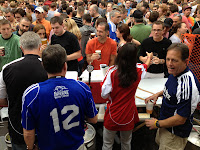 River Horse Brewing wrapped up its Oktoberfest last weekend, featuring its fall seasonal Hipp-O-Lantern Imperial Pumpkin Ale (among other brews), plus a cask version of its Special Ale, dressed up with bourbon-soaked oak chips, cinnamon and vanilla bean.
River Horse Brewing wrapped up its Oktoberfest last weekend, featuring its fall seasonal Hipp-O-Lantern Imperial Pumpkin Ale (among other brews), plus a cask version of its Special Ale, dressed up with bourbon-soaked oak chips, cinnamon and vanilla bean.The crowd that packed into the brewery and its back loading area made quick work of that cask Special Ale and jammed once again to brewer Chris Rakow's band, Ludlow Station.
If you're keeping score with the Lambertville brewery, then you'll know River Horse crossed a milestone at the end of this summer, something that the annual Oktoberfest was symbolic of.
Five years ago in August, River Horse gained new owners, a changing of the guard that not only rescued a troubled brewery but set it on a steady course that has delivered Garden State craft beer enthusiasts not only a more diverse and quality beer lineup but some really creative beers in the mix as well.
Oh, and the hippos on the six-pack packaging got a makeover, too.
But it was at the 2007 Oktoberfest, then a two-day affair at the brewery (it's now a more manageable single afternoon), that Glenn Bernabeo and Chris Walsh got to really mix with those beer drinkers who remained faithful to the brand and let them know that the new owners were a couple of guys who really appreciate beer and were dedicated to rebuilding the brand.
 Back in 2007, River Horse, the about 10 years in business, had fallen into inconsistency with its product quaslity, and among package store beer managers, the name was one that many were beginning to skip.
Back in 2007, River Horse, the about 10 years in business, had fallen into inconsistency with its product quaslity, and among package store beer managers, the name was one that many were beginning to skip. "A lot of folks thought we were out of business when we had that one and were a little surprised when they heard that things were not good," Glenn says, recalling that 2007 Oktoberfest. "That wasn't the case, obviously."
The turnaround, for a lack of a better term, involved restoring quality, shaking up River Horse's lineup that included a clutch of Belgian styles, some 1990s craft beer standards like amber and hoppy ales, and a lager. It also meant refocusing the River Horse market, ditching some distribution areas that one could easily argue had overextended the brewery.
 "What we've done since we've taken over is pull the footprint in to be way more local," Glenn says. "When we started we were in Virginia; we were in D.C.; we were in Delaware; we were in Maryland; we were in Rhode Island; we were in Boston; we were in upstate New York ... We've pulled those territories in, and right now, though production-wise we're much higher volume (but), it's concentrated in a much smaller area.
"What we've done since we've taken over is pull the footprint in to be way more local," Glenn says. "When we started we were in Virginia; we were in D.C.; we were in Delaware; we were in Maryland; we were in Rhode Island; we were in Boston; we were in upstate New York ... We've pulled those territories in, and right now, though production-wise we're much higher volume (but), it's concentrated in a much smaller area."We've become focused on being a local brewery. We're predominantly in New Jersey; we're in Philadelphia/five county; we're in Lehigh Valley, out to Lancaster a little bit, Manhattan, Brooklyn, southern Connecticut ... and that's it. That's been working for us."
Something else that has worked is sharpening the brewery's business approach. It didn't hurt the brewery added tank capacity, but Glenn says production efficiencies paid off as well.
"We have added physical capacity with respect to tank space. We've also done a lot of work around our yields; we've done a lot of work around our production timing and the production flow," he says. "At the time we weren't even getting the most out of the capacity we had. So we've grown volume even more than we've actually added tanks because we've gotten a little bit sharper at how we operate the business.
"Now we're very, very regimented in terms of what our brew schedule is, how our product is launched, our packaging schedule ... We have scheduled down days just for maintenance (and) quality control. We always had the mentality that if we get the product right first, then all of the other things are going to fall in line. So far, that's been true."
So what's next for River Horse?
"We're always experimenting. We've got a Scotch ale on the horizon, some smoked beers on the horizon," Glenn says. "We're going to continue to expand our product line and try to keep things interesting and fresh."



No comments:
Post a Comment